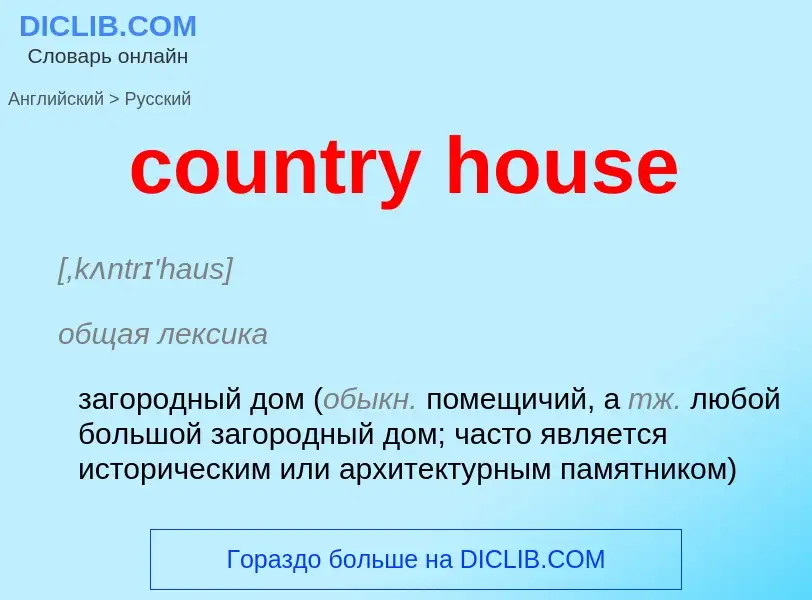Translation and analysis of words by ChatGPT artificial intelligence
On this page you can get a detailed analysis of a word or phrase, produced by the best artificial intelligence technology to date:
- how the word is used
- frequency of use
- it is used more often in oral or written speech
- word translation options
- usage examples (several phrases with translation)
- etymology
country house - translation to English
[,kʌntrɪ'haus]
общая лексика
загородный дом (обыкн. помещичий, а тж. любой большой загородный дом; часто является историческим или архитектурным памятником)
загородный дом
строительное дело
сельский (деревянный) дом
дача
Смотрите также
[,steɪtlɪ'həum]
общая лексика
величественный дом, замок (старинный помещичий дом или замок аристократа в Англии)
по начальным словам стихотворения Ф.Хеманс [Felicia Hemans, 1793-1835]:
The stately homes of England
How beautiful they stand!
старинный помещичий дом или замок
представляющий исторический интерес (часто открытый для посетителей)
существительное
общая лексика
старинный помещичий дом или замок, представляющий исторический интерес
Wikipedia
.jpg?width=120)
An English country house is a large house or mansion in the English countryside. Such houses were often owned by individuals who also owned a town house. This allowed them to spend time in the country and in the city—hence, for these people, the term distinguished between town and country. However, the term also encompasses houses that were, and often still are, the full-time residence for the landed gentry who ruled rural Britain until the Reform Act 1832. Frequently, the formal business of the counties was transacted in these country houses, having functional antecedents in manor houses.
With large numbers of indoor and outdoor staff, country houses were important as places of employment for many rural communities. In turn, until the agricultural depressions of the 1870s, the estates, of which country houses were the hub, provided their owners with incomes. However, the late 19th and early 20th centuries were the swansong of the traditional English country house lifestyle. Increased taxation and the effects of World War I led to the demolition of hundreds of houses; those that remained had to adapt to survive.
While a château or a Schloss can be a fortified or unfortified building, a country house, similar to an Ansitz, is usually unfortified. If fortified, it is called a castle, but not all buildings with the name "castle" are fortified (for example Highclere Castle in Hampshire).

.jpg?width=200)

![Christopher Hussey]] described it as "The most incomparable house in Britain, the one which created the greatest impression and summarises so exquisitely English country life qualities".<ref name="Country Life 1927">Country Life, Saturday, 7 May 1927.</ref> Christopher Hussey]] described it as "The most incomparable house in Britain, the one which created the greatest impression and summarises so exquisitely English country life qualities".<ref name="Country Life 1927">Country Life, Saturday, 7 May 1927.</ref>](https://commons.wikimedia.org/wiki/Special:FilePath/Brympton dEvercy 03.jpg?width=200)
![[[Forde Abbey]] in Dorset. Many country houses have evolved and been extended over several centuries. Here, the architecture runs from Medieval ecclesiastical to [[Palladian]] and on to [[Strawberry Hill Gothic]], while at sometime an attempt at unity has been made by the use of [[crenelation]]. [[Forde Abbey]] in Dorset. Many country houses have evolved and been extended over several centuries. Here, the architecture runs from Medieval ecclesiastical to [[Palladian]] and on to [[Strawberry Hill Gothic]], while at sometime an attempt at unity has been made by the use of [[crenelation]].](https://commons.wikimedia.org/wiki/Special:FilePath/Forde Abbey 06.jpg?width=200)
![[[Kedleston Hall]] in [[Derbyshire]], designed by [[Matthew Brettingham]] and [[Robert Adam]], one of the great power houses. [[Kedleston Hall]] in [[Derbyshire]], designed by [[Matthew Brettingham]] and [[Robert Adam]], one of the great power houses.](https://commons.wikimedia.org/wiki/Special:FilePath/Kedleston Hall 20080730-04.jpg?width=200)

![Trentham]], [[Staffordshire]]. During the 20th century, thousands of country houses were demolished, their stone and fixtures sold. During this era, many fine architectural features were transported to the US. Trentham]], [[Staffordshire]]. During the 20th century, thousands of country houses were demolished, their stone and fixtures sold. During this era, many fine architectural features were transported to the US.](https://commons.wikimedia.org/wiki/Special:FilePath/TrenthamBalustrade.jpg?width=200)
